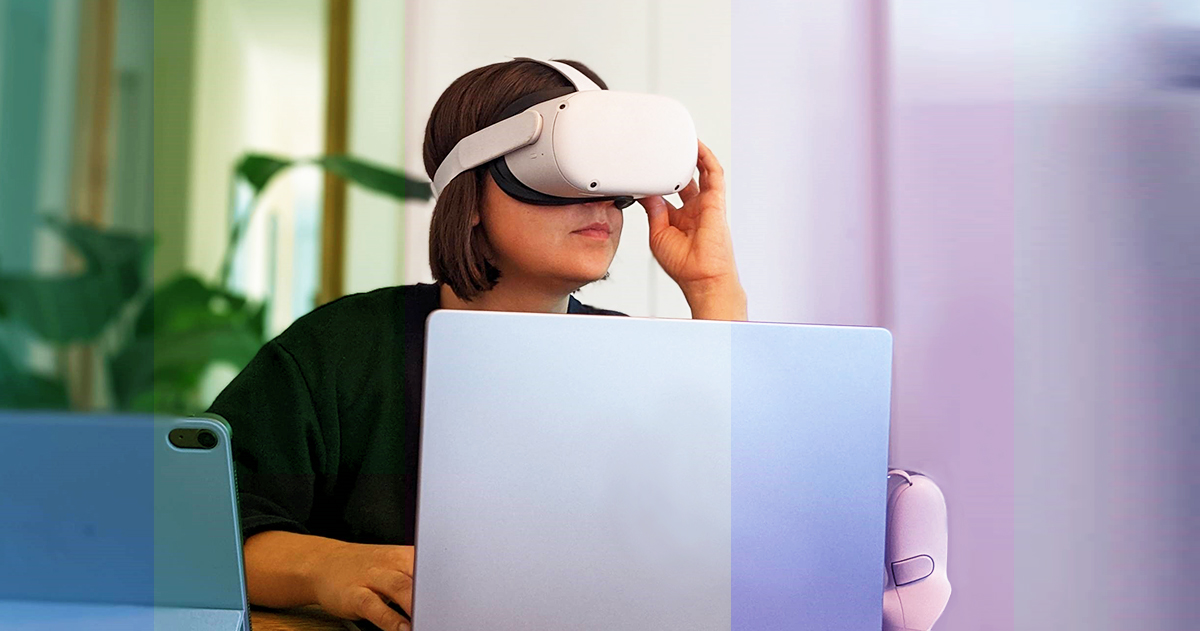The Metaverse is one of the most hyped future trends at the moment. And just like the other trending topics AI, NFTs and Blockchain, Second Life 2.0 is viewed critically from many sides. Reason enough for //next columnist Markus Sekulla to take a look at the pros and cons in the immersive working world.

Is it art, or can I dump this ? That's exactly what the majority of Internet users might have thought when they saw Mark Zuckerberg and the Eiffel Tower in a terribly poorly designed post that was also supposed to whet their appetite for the Metaverse. Well, that failed. Instead, it paved the way for countless memes and mockery.
My favorite: “I didn't know that the metaverse was painted using MS Paint?”
Is this what the metaverse is supposed to look like, and is this how I'm supposed to imagine my world in a few years? Maybe I'm too old for that, but please let’s not do that. I didn't find that exciting enough with Second Life. But if you believe the hype, it is more a question of when we will walk in the metaverse and not if. I agree when it comes to gaming. The concepts that are already on the market are strong and can, in my perception, not only advance the gaming market, but also the fitness market, as you could see at Gamescom in Cologne a few weeks ago.
What other areas of our lives could the Metaverse conquer? Maybe even our working world? As I said, in gaming – wow. But for most of us, work and gaming have as much to do with each other as fun and carnival (sorry dear Dusseldorf and Cologne people 🙂). In 10 years, will we all be sitting in our offices at home with our VR goggles and doing all our meetings from the comfort of our own four walls? Preliminary answer: no, but it will become an additional option. Let's take another deeper look into the crystal ball.
The world of work has changed more rapidly in the 2.5 years of the pandemic than it did in the 10 years prior. I therefore believe it will continue to change, especially in view of the crises that are looming. In the last 30 months, countless meetings have been shifted to digital platforms, eliminating thousands of work trips. That's positive for the environment.
I think you have to think about the metaverse a bit more broadly than just VR glasses. So you can say that a Teams or Zoom Call is also already the Metaverse, because when we look behind the monitor repeatedly, we will notice that the colleagues are only in the room with me in digital form. It's certainly not as immersive as the experience with VR goggles, but the concept is similar. That this type of metaverse will catch on... 100%.
However, if we take a narrower grip on the Metaverse and look at how wearing VR hardware affects our working lives, we're not yet at the point with the technology where you can really enjoy this working in the long run. However, as always when big companies are interested, the technology is evolving quickly and we should give it new chances often, even if my first attempts were disappointing to say the least. Also, working without VR hardware is on much longer bearable than with. We tend to be more tired with the goggles and there is also some risk of dizziness. This is not personal anectdata from me, but the result of a study by the University of Coburg [pdf]. In this study, test persons had to work with VR glasses for one week. The (as of 2022 not very surprising) result:
With the VR technologies currently available, the virtual office offers an „inferior experience compared to the real world.”
Mark Klein also reports in his //next column about the exhaustion that overcomes you after 2 hours of VR meeting. In addition, he describes that meetings are getting more stable on the software side and that you can interact better with other call participants in a metaverse than in a Teams or Zoom call. This is a potentially good alternative, especially for meetings in which not everyone comes from the same city or is even distributed internationally.
So for me, the key question is: How do we imagine the workplace of the future? Unfortunately, this question is as multi-layered as a croissant in Brittany. The biggest layer for me is social interaction, which I think most of us missed in our Corona days. That said, remote office plays a much more important role for almost everyone than it did in 2019, so the future is in the mix:
And perhaps of immersive metaverse meetings with people around the world and walking meetings in your city.
The Metaverse still needs years to really arrive across the board in our working world. This is not only because the hardware is not as widespread, but also because the software, studies show, is not yet suitable for prolonged use. But the vision of international meetings without having to get on a plane may not sound future-proof to me at the moment, but the ideas sounds better than great.
Text: Markus Sekulla
You find the German version of this article here: Wie gut passen Arbeit und Metaverse zusammen?
Most popular